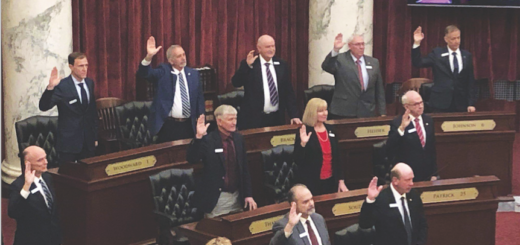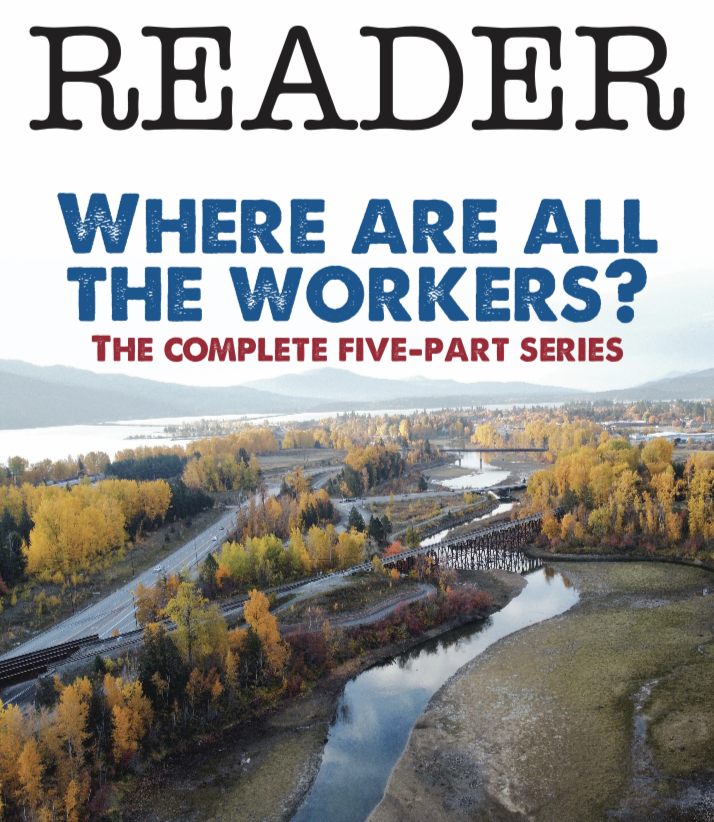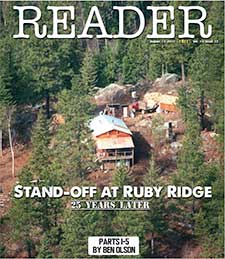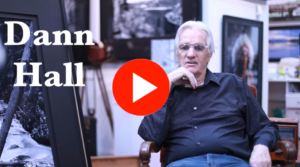Congressman Russ Fulcher sits down for a Reader interview
By Reader Staff
Publisher’s note: Congressman Russ Fulcher, R-Idaho, came to the Sandpoint Reader offices on April 23 for an interview, but we didn’t have enough space to run the full interview in the April 24 paper. Here is the entire interview, with some edits for clarity and length:
BEN OLSON: President Trump’s plan to “Free Up Our Forests,” calling for 280 million acres of National Forest land to be logged, has got a lot of my readers a little concerned. Meanwhile, Congressman Simpson broke with the administration and Idaho delegation with the “Public Lands in Public Hands Act,” which would prohibit the sale of the public lands. I’m curious where you fall on that. Do you support privatizing public lands in Idaho?
RUSS FULCHER: No, but in order to to share a perspective on that, I need to at least try to communicate a 30,000-foot view that I don’t think many people are familiar with. …
The biggest surprise I had going to Congress, which has been seven years ago now, was coming to the realization that if you’re a member of Congress from the Midwest or the East, you have no idea what public land is, or federal land. It just doesn’t exist, and we operate our budget to some extent with PILT, Payment in Lieu of Taxes, [and] SRS, Secure Rural Schools, and my colleagues in the Midwest in the East hate it because they’re funding that. We just got that by three votes this last cycle. …
[L]ocal management of public land is coming, whether we want it or not. And it’s gonna be driven by the Midwest and the East, because they don’t wanna subsidize us anymore. … [R]egardless of what your position is on that, we’re in no position to do it. We don’t have a plan — the West in general. There’s no discussion going on. So my efforts and generally what I’m trying to do is pull everybody to the table.
We just did a forum in Valley County six, eight weeks ago. Pulled in the Forest Service, Department of Interior, BLM, local municipality, private sector and I made the statement then, I said, “Look, everybody, look left, look right. We have got to figure out how to manage what’s under our feet because nobody has the resources to do [it] on their own.”
The federal government is well over $100 billion in backlogged maintenance on funded stuff and their budget is going down, it’s not going up. They are absolutely overwhelmed. And the state can’t handle it, right? The private sector, [the] infrastructure is no longer there.
In your lifetimes, you’re all from this area … the infrastructure is gone. It’s just not there. So to answer your question, no, I don’t believe I want to privatize it, but I do believe that we’ve got to figure out how to manage it locally because the resources aren’t there nationally.
This last year we burned up 1 million acres, almost all of it was on federal land. And that’s just not right. The carbon that gets pumped in the atmosphere, the loss of wildlife, we just can’t do that, and then you spend an immense amount of money to try to suppress that. So it’s a lose-lose deal.
I don’t have all the answers, but I do believe that included in the answer is leveraging the resource base across the board. Keep it public, but enable the local municipalities, the private sector to engage when there are these fires, and that’s part of the struggle that we have right now, but you got a logging company that’s within proximity of a fire, they can’t legally turn a wheel on a dozer or whatever to put it out.
This is not revolutionary, but my gosh, we’ve got to be able to knock down some of those barriers and use all the stakeholders there.
BO: I see your point on that, but when we see Idaho taking a hand in public lands, it ends up going to the private sector. Priest Lake lots have been selling for years, because Idaho has to make some sort of profit, whether it’s mineral extraction or sale to the private sector. We have people here who say their primary reason for living in North Idaho is because they are surrounded by amenities that they recreate and hunt and fish in.
RF: I hear you. Two things: I’m not saying that title needs to transfer. There are a lot of people who say it should and maybe it shouldn’t, but that’s not necessarily where I’m trying to go with it. Or if it did, maybe part of the answer is that there’s a state constitutional mandate to keep that open.
I’m certainly open to those types of discussions. The intent is not to try to privatize, the intent is to try to manage it. The intent is trying to take care of it.
Do I have all the answers? No. Does anybody else? No. And I’m just telling you, I think it’s imminent. I really do. … When you’ve got the majority of members of the U.S. House and Senate who don’t like the current system, something’s gotta give somewhere in there. …
ZACH HAGADONE: The “Public Lands in Public Hands Act” that Simpson has co-sponsored. Do you see a role for that?
RF: I don’t know the details of it. But that sounds to me like that’s a great way to lock stuff up so that you’re in the same system we’re in.
ZH: So you would oppose that?
RF: I gotta look at it because I really haven’t, but on the surface I think that is likely to probably lock in the current system, which is problematic. … I’d need to look at it closely, but on the surface that doesn’t sound like something I would be bullish about.
BO: We know you’re on the Pro-Life Caucus; we know your stance on abortion. I’m just curious if you have paid attention to what’s happening in the rural hospitals like Bonner General Health, which closed their prenatal and OB-GYN department after that decision [Dobbs v. Jackson Women’s Health Organization and Idaho’s resulting near-total abortion ban] out of fears of criminal prosecution for doctors and health care personnel and that was quite a blow to the community.
You wrote, “My concern for life doesn’t end with the child. It includes ensuring women receive general gynecological care and proper maternal care during and after pregnancy.”
What do you say to the Idaho mothers-to-be who are now driving hours for basic prenatal appointments?
RF: I can tell by the premise where you’re at.
BO: Yeah, I’m very proudly pro-choice for women.
RF: You’re entitled to that view, but I stand with the position that those are local state decisions …
BO: So local mothers should continue driving hours to get prenatal checkups?
RF: The state has the right to make the decision on the issue. And I will check into your claim that that’s the reason why those doctors left or whatever. So far, when we’ve done that, there’s just more to it than that, and if that’s the case, then OK, that’s the case, but they at least have the option of going next door, because it’s legal there.
But no, I support the state decision to make that call, and they have in this state. This state is overwhelmingly pro-life. And the Legislature likes that, and I’m there with them. But in fairness, I think it at least deserves some consideration if there’s been a local hospital change; but, if so, it’s the first one that we will be able to validate.
ZH: … [O]ne of our District 1 representatives, Mark Sauter, has actually come to regret voting the way that he did on that. He voted to support Idaho’s near-total abortion ban, and he came to regret that on a … national TV interview. He described the exodus of doctors resulting out of that as an unintended consequence that he hadn’t thought about. …
RF: Zach, OK, I need to see data. … Idaho is a destination for the medical community. Overall, doctors want to come here.
ZH: Well, southern Idaho perhaps.
BO: You’re familiar with the WWAMI program and all the…?
RF: Oh, I’m very familiar with the WWAMI program, but generally speaking, though, we’ve got the rural issues, and that’s always been the case. Right? But, we’ve also got ICOM [Idaho College of Osteopathic Medicine, in Meridian], which, that was a number of years in the making, it’s just starting to see some fruit. So there’s some hope on that front, too, I think. But there’s always been a debate on how [to] incentivize, especially the general practitioner docs, to be in the rural part of the state, and that’s an ongoing struggle that goes far beyond the life issue.
BO: Like I said before, we hear from our readers all the time about issues that affect them. A lot of people reaching out to me right now are terrified about what’s going on at the national level. They see a lack of accountability in the actions and statements made by the president, you’ve got tariff rollouts affecting the market in negative ways, threatening rhetoric about Greenland and Canada being the “51st state,” the Panama Canal. We’ve got mistaken deportations of people like Kilmar Garcia and the lack of due process involved in that. Open defiance of judicial rulings…
RF: So other than that, you’re pretty happy, huh?
BO: You enthusiastically praise Trump for these decisions, but I’m just curious, do you have a line? Do you have a line in the sand?
RF: Again, you gotta go to kind of the basis of what’s going on that is not getting talked about. We’ve got $37 trillion in debt that is unsustainable. We are paying more today in debt service than for our military defense budget. That’s just the debt service. It is not sustainable, OK?
So a lot of what you talk about has to do with what I call a “bureaucratic intervention,” and I’m just telling you, you can agree or disagree, but the bureaucratic Washington, D.C. swamp has gotten so huge. … I would argue there is a parallel form of governance through these agencies that have slowly over the course of time, got into power via regulations and bureaucratic rules … that never went through Congress whatsoever.
And with that has come a massive amount of inefficiency, a massive amount of bloat and a massive amount, quite frankly, of fraud. We don’t know for sure, but an example is how many dead people we’re paying Social Security. It’s at least in billions. …
[Editor’s note: According to the Associated Press, while about 18.9 million Social Security numbers associated with people born before 1920 had not been identified as deceased, “That does not mean, however, that these individuals were receiving benefits.” According to a researcher at George Mason University quoted by the AP, “Social Security would be near the bottom of the list, not near the top” among “places in the federal government where error rates are high.”]
Part of it is the accountability component and part of it is frankly, old systems that haven’t been looked at … [L]ook, I believe that this intervention desperately needs to happen in a sense that they’re at least getting looked at. Now, is there mistakes that are gonna be made or happen? Yeah, I’m sure there will be and there has. That’s what happens when you do that. You gotta find it, you gotta fix it, but if you never look at it in the first place, then you continue on with what we’ve got.
BO: So possible violations to the Constitution don’t…
RF: Are you referring to the immigrant thing now? First point to discuss, whether you acknowledge it or not … there is a massive amount of bureaucratic need for accountability and transparency that’s simply not there. Right, wrong or indifferent, it’s finally getting looked at. I personally believe that’s a healthy thing.
It has taken a long time to get where it is and so fixing it overnight is not gonna happen, but at least it is being looked at. …
On the immigration front, guys, if we were sitting here in 20-30 years … we’ll look back on the last four years of an open border as the worst policy of that administration, and quite frankly, the worst failure of this Congress because we were not able to override it. We’ve got 10 to 20 million people, whatever that number is, we don’t know for sure, many of whom we have no idea who they are, but there are some that we do know. Has that triggered a move to try to go after those who are hostile? Yes, it has. Should it, in my opinion, yes, it should.
BO: Should due process also go by the wayside?
RF: No, no. I can tell where you are going with that — of course not. But should they be here in the first place? We’re in one heck of a spot.
BO: It’s hard for me when I hear, “but” when you’re talking about Constitutional…
RF: Well, let me back up, of course there should be due process. … Does that mean that by default you defend the last four years policy of opening it up? … Be fair here: What do you do when you’ve got four years of open border?
BO: Define open border.
RF: What we’ve had the last four years.
BO: Which is?
RF: No restraints on who comes and goes.
BO: So you’re saying there are no restraints? So somebody can just walk right across the southern border without going through any checkpoints. That’s what you believe that southern border is right now?
RF: That’s what’s happened.
BO: I go down there to see my mom, she lives right on the border. I wait for three hours to come back in the border, I talk to Customs and…
RF: Let me get this straight: Are you telling me that you don’t believe we’ve had an open border?
BO: I’m telling you that I believe the term “open border” is a bit of a misnomer.
RF: Are you trying to communicate you don’t think that or you believe that we’ve had proper restraints on who comes into the country?
BO: I’m saying that we have a border that is not open. We can talk about immigration issues left and right, but using the term “open border” implies that…
RF: Let me answer your question. Of course there should be due process, but how it should work, and I’m not saying it has in every single case because I don’t know. But I can tell you that we’re in a heck of a spot and they’re attempting to do something about it with the worst offenders, and we’ve got to do something because that’s first and foremost the responsibility of the federal government is trying to keep a safe place for us to live.
But whether you’re a citizen or not, yes, you’ve got rights in this country, and that should be adhered to. There is a process, there should be a hearing. If there’s a deportation order that’s made after that — that’s it if you’re a non-citizen — but there is and should be a process for that.
BO: President Trump just said, “We can’t have trials for everybody.”
RF: In the case of those circumstances which, from what I can tell are very, very limited, should we fix that? Yeah. … But you still have to go back and look at the overall situation. What would you do? I mean, if you know that you’ve got this breach, what do you do? This is a serious deal, and it’s like everything else: When you find issues with your audit, when you find issues with your process that’s not working well, then you work to fix that, but you don’t ignore the overall problem.
ZH: I don’t think that many people, if any, of good faith would disagree with the idea that we need to have government efficiency, that we need to have changes to the way we do our border policy. I don’t think that that’s necessarily a controversial idea. What I think is more controversial is the way in which the administration and Congress are going about addressing those issues. …
[W]e have readers who contact us and they’re scared because they don’t know what policies are gonna come down, they don’t know how certain of these policies are going to affect their own personal wealth, their ability to do their jobs. … So at what point does the cure that the administration and Congress is trying to implement for some of these issues become more damaging than the disease?
And where is that line where we start to see, “OK, look, we know we have these problems, but the ‘chainsaw’ approach is doing more harm than good.”
Where do you see that ending?
RF: I’m not sure there is a blanket answer. You’ve got to look at stuff case by case and see where that set of circumstances takes you.
I will say, I think one of the struggles I’ve got is on the tariff front. That’s not been clear, and to be honest, I’m not sure how well or how thoroughly that was thought out.
I have talked to the president, not extremely recently, but I know, because he shared part of his objective there, and that is foreign investment. And I believe in his mind right now, if he were sitting here and we ask, he would say, “Tremendous win so far,” because there is plus-minus $7 trillion committed in investments starting to happen across all industries from other countries coming into the U.S. and that’s huge. And so if you’re a business guy on a grand scale, OK, that is huge. However, if you’re a mom-pop A-B-C company in Sandpoint, Idaho or Meridian or wherever and you make widgets in Mexico and then you bring them back into the country and you don’t know and you can’t anticipate what that tariff is going to be, that’s problematic, and we’ve got some of that. And that really does need to be fleshed out.
ZH: In our particular area here, we’re the only international border that Idaho has, so when we talk about border policies, whether that be, you know, like immigration or trade, it directly impacts Bonner and Boundary counties, more so, I would argue, than a lot of other places in the state. So we are a border community and we’ve already seen … a 12 to 17% decline in the number of border crossings from Canada, which directly impacts our tourism industry, which is a very big deal here. We can’t seem to find hard numbers on what that’s gonna mean, but if we have a significant decrease in Canadian tourism, that’s gonna harm all of our local businesses in various ways, and in addition, we have a very robust building community here, which relies on purchasing building supplies from Canada, so we’ve got several different industries, which are immediately being affected by this tariff situation … [I]f we don’t have construction and we don’t have tourism, there’s not a whole lot left up here. This is like an existential threat.
RF: That’s fair. I’m hearing some of this for the first time, but I do get that, and we’ve had some specific issues with Mexico in particular. … Here’s where I think it’s gonna go: I think that there’s gonna be, I’ll just say “resolution” for pretty much everyone except China. I’m just telling you that since the first first day I’ve been in my office, because of my personal experience in international business and just knowing what I’ve learned on the congressional front, I have counseled anybody who asks, you name it, chambers of commerce, companies, if you’ve got supply chain dependent on China, move it because this is not gonna end well. You can see this coming and it goes so deep, it’s on so many fronts; there’s military concerns. There’s monetary concerns with the dollar, there’s social concerns, there’s the threats. It’s just not good. And I’m not optimistic about solving the problem with China on the tariff front. I do believe that it’s gonna be resolved in short order with Canada.
BO: But don’t you think there’s some damage that has already been done?
RF: Damage depends on how you define it. But here’s the other thing I would say to that. … When you’re the world’s largest market, sometimes you do get discriminated against, and at first you put up with it because your market is so big itself, right? Try to sell semiconductors into Asia, if you’re making it in Boise. Try to sell a Ford or Cadillac in Europe. You can’t do it. Our market is so big, we’ve allowed that to happen. Now, from a Trump standpoint … I think he’s right. That should be leveled out. So I think that’s gonna create some uncertainty in the short term, and I think we’re seeing that now. I’ll be honest with you. I hope not, but I think that the stock market levels and I think that overall value is going to be lower for a year or a period of time because it takes that much time for this to settle out. But, once again, over the course of time, I do believe that that’s getting reset generally in a more healthy direction, and I would say the investment long-term economic ramifications are likely to be really good. Am I a huge tariff fan? No, but I think that minus China it’s gonna resolve. That’s the 30,000-foot level.
ZH: So, to cap it off, the initial question was “How do you respond to constituents who are worried?” Is your response “Hang on?”
RF: If it’s your 401(k), yeah, hang on … if you’re X-Y-Z company and you’re dependent on timber or whatnot? Talk to us. Guys, I don’t think that all these policies, they’re not set, OK? That’s where, at least to some extent, we come in on those issues. We’ll go try to be a champion. It’s in our best interest to have Idaho businesses healthy, OK? And we can try to have an influence on that, and I can tell you another thing that we didn’t talk about, one of the changes in this administration, at least for us, is the access is unparalleled. Good, bad or indifferent, we’ve got access to the administration, to the agency heads, to the cabinet, the president directly I’ve never had. By far, the biggest impact we have in our office is not through me, it’s through … the offices around the state with constituent service stuff. It’s the IRS issues. It’s the VA issues. It’s that Medicare, Medicaid all that stuff. We can have a shot of doing something about that now. And we just didn’t have that access before. And so, my vote is oftentimes the least influential thing I got. … So that’s a long-winded answer to the second part of your question, which is, “Bring it to us.” [L]et us see if we could we can help on the tariff front. … So anyway, I openly ask for feedback and counsel on some of these issues, because we don’t have all the answers, right?
BO: I appreciate that. In return, I would openly ask that you consider the opinions of everyone in Idaho, not just the ones who vote “R.” … We’re seeing a lot of people who are getting turned off right now, many of them traditional old-school Republicans. They’re filling our pages with letters saying, “How dare they say this, how dare they do that? Threatening my social security,” I mean, we’re seeing it from Republicans right now.
ZH: That’s basically all we have here.
BO: Right, this is not a Democratic area. The mood is souring right now.
RF: That’s fair. And I would like to tell you that calmness is on its way. But it’s not.
BO: So, … “Trust me, bro,” that’s kind of what you’re saying then?
RF: I think you’re gonna see a wrecking ball going through a lot of these, and overall I think that it’s warranted, that at least there is being attention given to it. … We do so much communication on this front. There is nothing I’m aware of that says Social Security is going to get cut. There’s nothing I’m aware of that says Medicaid is going to get cut. And that’s my committee, I’m on Energy and Commerce. I can tell you there are going to be some changes, but it’s not gonna be cutting on the benefit front, at least that I’m aware of, all right? I had two members of the other side of the aisle in my district a week ago saying openly that there’s $800 billion … that Republicans voted to cut. We haven’t even had a hearing. I would know, it is my committee. So, with that kind of thing, if you hear that … ask, OK? And I’ll tell you at least where I see it, OK?
Ben Olson is the publisher of the Sandpoint Reader and Zach Hagadone is the editor-in-chief of the Sandpoint Reader.












 Coming up this week! Don’t miss Live Music, the Summer Sampler, the Art Party, Monarch Grind, the Sandpoint Renaissance Faire, and more! See the full list of events in the
Coming up this week! Don’t miss Live Music, the Summer Sampler, the Art Party, Monarch Grind, the Sandpoint Renaissance Faire, and more! See the full list of events in the 